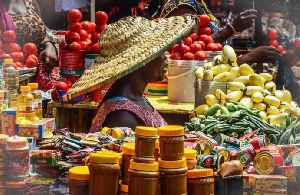 The World Bank estimates that about 36 percent of Ghanaians are poor
The World Bank estimates that about 36 percent of Ghanaians are poor
The burden of inflation and low growth are impacting negatively on the vulnerable, and pushing more Ghanaians into poverty, the Acting Country Manager of the World Bank, Mrs Eunice Ackwerh, has stated.
“The World Bank estimates that about 36 percent of Ghanaians are poor and that more than a quarter of the people live on less than $2.15 per day,” she said.
She said that the poor were the most vulnerable, hence there was the need for the country to implement policies to ensure that severe poverty conditions were addressed.
Mrs Ackwerh made the call at the World Bank End Poverty Day programme, held in Accra on the theme “Delivering with Ambition”.
The event was part of activities to mark the International Day for the Eradication of Poverty, celebrated every year in the month of October.
The programme that was mostly attended by the youth provided opportunities for officials of the World Bank to highlight projects the financial institution was financing to create jobs and address poverty in Ghana.
These included Ghana Economic Transformation project, Greater Accra Resilient and Integrated Development project, Ghana Development Financing project and Ghana Economic Transformation project.
The extremely poor, Mrs Ackwerh noted, were those most severely impacted by poverty, struggling with basic needs and social marginalisation.
The Acting Country Manager said while the government was intensifying efforts in growing the economy, measures should also be instituted to protect the vulnerable.
“It is essential for countries including Ghana to implement policies that not only enhance their income and access to basic services, but also complement climate investment,” she said.
A Senior Economist at the World Bank, Mrs Tamoya Annika Lois Christie, highlighted that the coronavirus pandemic had significantly impacted and slowed development for the country.
“Ghana’s pandemic economic recovery is hindered by persistent macroeconomic instability and fiscal challenges, underscoring the need for targeted policy interventions,” she said.
To respond to the crises, she said that Ghana had negotiated a three-year International Monetary Fund (IMF) programme of about US$3 billion to help restore macroeconomic stability.
An economist at the World Bank, Mrs Laura Rodriguez Takeuchi, said majority of Ghanaians fell below the global poverty line, and mentioned that poverty in the country was concentrated in the Northern part of the country.
She emphasised the importance of investing in human capital initiatives that provided access to quality education and improved healthcare access to promote development.